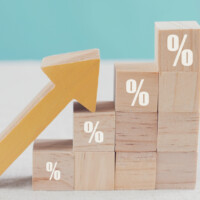
The Consumer Prices Index (CPI) measure of inflation rose by 2.2% in the year to July, official statistics reveal. While it is the first rise recorded in 2024, it is a more modest increase than expected by the market.
After hitting the 2% target in May 2024 and holding in the year to June 2024, inflation has crept up again to 2.2% in the 12 months to July.
However, this uptick is smaller than expected by the market (2.3%), while the Bank of England forecast 2.4%.
According to the consumer price inflation figures from the Office for National Statistics (ONS), the largest upward contribution came from gas and electricity prices, which fell by less than they did last year.
It noted that although monthly gas and electricity prices fell by 7.8% and 6.8% respectively in July 2024, as these falls were less than their equivalent falls in July 2023 (25.2% and 8.6%), annual prices fell by a lower amount in July 2024.
The ONS added: “Although energy prices are lower in July 2024 than they were a year ago and are much lower than their peak in the first quarter of 2023, gas and electricity prices in July 2024 are still around 68% and 45% higher, respectively, than in March 2021.”
Meanwhile, the largest downward contribution came from restaurants and hotels, as prices fell this year compared to a rise last year.
Prices for restaurants and hotels fell by 0.4% between June and July this year, compared to a rise of 0.9% a year ago. The annual rate rose by 4.9% in the year to July 2024, down from 6.3% in the year to June.
Scott Gardner, investment analyst at digital wealth manager Nutmeg, said: “The summer months traditionally see an increase in consumer spending, whether on hotels and holidays, restaurants and bars or spending on leisure activities while children are on holiday. The increased spending over the summer tends to ease again in the autumn.”
Elsewhere, the ONS revealed that core CPI, which excludes the more volatile energy, food, alcohol and tobacco, rose by 3.3% in the 12 months to July 2024, down from 3.5% in June. The CPI services annual rate fell from 5.7% to 5.2%.
Inflation uptick’s impact on the base rate and savings rates
Shaun Port, managing director for Savings at Chase UK, said: “While the Bank of England’s recent decision to lower interest rates was positive news for borrowers, this slight uptick in inflation comes as no surprise. Domestic inflationary pressures and services inflation are persisting and still causing concerns – as a result, there might be lower expectations about if and when the next base rate cut could occur.”
Adam Thrower, head of savings at Shawbrook, said: “This rise may potentially push further interest rate cuts further down the line. Yet, with cuts still expected in the future, savers’ chance to secure high returns is shrinking fast. The race is on – despite the challenging outlook, the growing demand for longer-term fixed accounts signals that smart savers are locking in rates now. Inflation-beating returns won’t wait – so savers might want to act now before the window closes.”
Ruth Gregory, deputy chief UK economist at Capital Economics, said: “This may not alleviate the bank’s concerns about persistent price pressures entirely. And it probably isn’t enough to prompt a back-to-back interest rate cut in September.
“But it does lend some support to our view that CPI inflation will be back below the 2% target next year and that interest rates will fall further and faster than markets expect. Accordingly, we are sticking to our view that the bank will pause in September, and that fading services inflation will mean rates fall to 4.5% this year and 3% next year.”
This article was first published on Mortgage Solutions‘ sister site, YourMoney.com. Read: Inflation rises for the first time this year… as expected, but less than forecast
Paloma Kubiak is an award-winning journalist with 15 years in the trade. She has the NCTJ qualification in media law and Government, and gained a bursary to undertake the Press Association training where she passed 120wpm in shorthand. Paloma started her journalism career at local paper, the Ealing Gazette and Leader series just at the onset of the global financial crisis. During her time at the paper, she was promoted to senior multi-media journalist.
In 2011, she joined MoneySavingExpert.com as a deals researcher and writer, before moving to the news team as a reporter covering personal finance. She was runner up in the Santander FinCon Media Awards 2014 in the ‘best newcomer’ category.
In 2016, she joined YourMoney.com as a senior reporter. Commended in the 2017 Unbiased Media Awards 2017 for the ‘Best Value of Advice’ article, she then went on to win ‘Household Money Journalist of the Year’ at the 2017 Headline Money Awards. Paloma was also included in the UK’s ‘Wonder Women in Finance’ in the same year, compiled by Finder.com.
She has been writing about and researching personal finance for the past decade and is editor of YourMoney.com.

